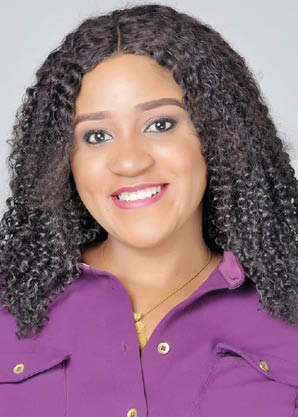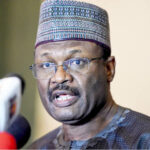One in 10 girls miss school because they cannot manage their monthly period well. To help bridge this gap, Tabitha Arenson Abimiku started to produce re-useable pads which are given free to indigent girls. The pad is also eco-friendly; which helps meet the Sustainable Development Goal (SDG) 12 on responsible production and consumption. This earned her the Tony Elumelu Foundation (TEF) Grant 2019.
How did it all start?
Growing up, I always wanted to help the less privileged, and as I grew older, I found myself drawn to the girl child.
We found out that every month, one in 10 girls miss school because they cannot manage their period. So, in 2015, I began to search for communities where there are such girls and distribute sanitary towels.
I started going to the IDP camps since 2016 to do this as well. But I discovered that since it was what I was doing from a sole sponsorship: from family and friends, it was not going to be sustainable. So the months we don’t provide for them, they will be going back to using rags.
So I started looking for a lasting solution, and in 2017, we started making Virtuous Pads because of our passion for the SDGs: which is that for everything you are doing, you must be conscious about the impact on the environment. So we thought of the re-useable pad, which is eco-friendly, sustainable and yet provides the comfort that women need.
So you make the sanitary pad?
I started making the pad, but the demand was becoming too much, so because of the skilled manpower involved, I started outsourcing. But by winning the Tony Elumelu Foundation grant, we hope to use the seed capital of $5,000 to buy the customised machine. I will increase production to meet up demand.
I tell people that my mission is to transform Africa through this virtuous pads. This is part of the empowerment that you can give to any indigent girl. I want to do this to promote decent work and economic growth. Once we resume mass production, we are going to ensure that we employ most of our beneficiaries; the girls.
Do you sell or give out what you produce?
We give it free for girls in the IDP camps and in interior communities. But because of the demand, some of the beneficiaries are sales representatives who sell these sanitary towels/pads at affordable rates. With this, they are able to generate income for themselves. We are not just providing sanitary pads for these girls, we are trying to alleviate poverty as well. So we are creating jobs for some of the beneficiaries: which is one of the SDGs.
We have also trained beneficiaries on customer service. We have distributed about 5,000 re-useable pads and we have trained some of the girls in some of the communities like Gbagalape, after Nyanya.
How do they use the pad?
It’s easy to use and wash. It is created from bamboo charcoal that has anti-bacteria and anti-allergy properties and it gives flexible protection. When they use it, once they deep it in water, the blood comes off. They do not need to wash it for long. So they dry it and re-use. This is better than rags.
How can they manage this when there is no water in some communities?
We know that this is a better alternative because the girls use rags and foam and still wash them.
You just won the TEF Grant. Can you tell us about it?
Virtuous Pads just got the TEF Grant. I got selected among the 3,000 entrepreneurs that got the grant this year based on our mission to transform Africa. I won on the waste management category. You know, in a year, we have over two million sanitary towels that end up in our environment. So, they felt our idea of the re-useable pad was eco-friendly and was going to rid the environment of such waste. So aside helping people that cannot afford disposable pads, this also helps the environment.
This has boosted our morale; that we are doing something right. With this, we will be able to purchase the customised machine and increase our production output. With that also, we can reach five more states before the end of the second quarter and be able to create jobs for about 50 more people apart from the girls that are selling in their communities. But we will still be giving girls in the IDP camps free of charge.
What skills have you learnt to help you remain in business?
Two skills: growth mindset and resilience. Growth mindset shows that everything can be learnt. I am a microbiologist and an entrepreneur. I read microbiology from the University of Jos (Unijos) and then have a Masters in Medical Biology. I never planned to become an entrepreneur. There are many challenges, but the passion and purpose for this has kept me going.
With resilience, you are able to weather the storm.
What has helped you grow in this business?
Mentorship is key and cannot be overemphasised. Helen Asimegbe is one of those that propelled me. Ife Durrosimi-etti, a co-founder of Parlaimo Bambini in Lagos, has helped us to brand this product. Mentors will hold your hands to prevent you from making mistakes they made, hence you will achieve your goals faster.
How can we encourage and support innovation in Nigeria?
Innovation comes from identifying a problem. If you put yourself in the shoes of people having a particular challenge in a community, then get a solution to the problem; that is innovation.
Our target market is people in rural communities who cannot afford disposable pads. Some don’t have money to eat, and then you want them to buy disposable pads which cost like N400; every month. We sell as low as N100 in rural communities, and we have it in small, medium and large. This pad can last up to a year.
We hope to see this grow beyond Nigeria and have it in more African countries. We are on a mission to transform Africa; one girl at a time. Nigeria alone is a big market; knowing that almost half the population of the world menstruate monthly.
My husband and family have been a great support for this business. My husband has been the main driver for it.

 Join Daily Trust WhatsApp Community For Quick Access To News and Happenings Around You.
Join Daily Trust WhatsApp Community For Quick Access To News and Happenings Around You.


